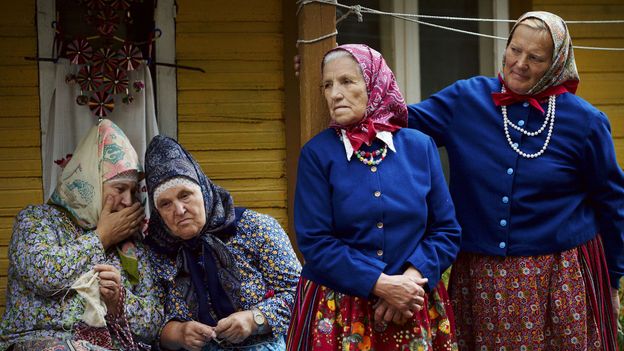
Hands etched in wrinkles that run like tributaries toward her wrists, a woman in a colourful skirt sits alone in her kitchen. The day's chores aren't done – to run a farm as she has done all her life means to be constantly in motion, tending chickens and sheep, making clothes and fixing tractors. But for now, she has narrowed her focus to the click of the knitting needles that sway rhythmically in her hands. She is knitting her funeral clothes.
This is a story about the past that is important for the future
This is Kihnu, known as the Island of Women, an isolated place in the Baltic Sea off Estonia's western coast. Often referred to as Europe's last matriarchy, the island community is one primarily powered by the strength and resilience of women. Keepers of a culture so rich it's on Unesco's intangible cultural heritage of humanity list, the women of Kihnu balance the responsibilities of farming, child rearing and daily life with the inherited duty of maintaining ancestral traditions. In a place where men have historically been absent – working at sea or abroad – the role of women on Kihnu has expanded beyond traditional gender roles and into every aspect of life on dry land.
They are the keepers of song, dance, traditional weaving and handicrafts. They're also the primary conductors of rites of passage like weddings and funerals.
You may also be interested in:
• Estonia's unlikely 'fifth-season'
• Are Lithuanians obsessed with bees?
• India's indigenous matrilineal society
It was death that brought life to Big Heart, Strong Hands, a book by Norwegian portrait photographer Anne Helene Gjelstad. Invited to the funeral of a woman on Kihnu, Gjelstad found herself in a kitchen surrounded by elderly women dressed in blue, the colour of mourning. In that moment, she knew she needed to share the story of these aging protectors of the circle of life.
“This is a story about the past that is important for the future,” she said. “It was my inner belief that I had to capture this, put it in a book, write the stories.”
The portraits and stories that Gjelstad captures tell the tale of a place steeped in the traditions of Kalevala-metre songs (an ancient oral tradition of musical storytelling), brightly coloured woven and embroidered clothing, and the women's ability to take on everything from motor repair to animal husbandry. It also tells a story of survival, though one with a precarious future.
Through harsh weather and 50 years of Soviet occupation, these matriarchal traditions have endured. But a cluster of forces – including the flight of the younger generation in search of more opportunity – now endanger this unique island culture. Though seasonal tourism thrives as curious visitors come to learn about Kihnu's rich traditions, providing a much-needed lifeline to the island, the population dwindles as it ages.
For generations, Kihnu ways have been passed down through this line of women. But with each funeral, another thread of the culture unravels. In her book, Gjelstad documents these matriarchs, chronicling a fading present and preserving it for a changing future.
(Video by Anders Jørgensen; text by Christine Sarkis)
This video is part of BBC Reel’s Through the Lens playlist.
Join more than three million BBC Travel fans by liking us on Facebook, or follow us on Twitter and Instagram.
If you liked this story, sign up for the weekly bbc.com features newsletter called "The Essential List". A handpicked selection of stories from BBC Future, Culture, Worklife and Travel, delivered to your inbox every Friday.
"last" - Google News
May 14, 2021 at 04:59AM
https://ift.tt/3uLyutq
Travel - Kihnu: Europe's last surviving matriarchy - BBC News
"last" - Google News
https://ift.tt/2rbmsh7
https://ift.tt/2Wq6qvt
Bagikan Berita Ini
















0 Response to "Travel - Kihnu: Europe's last surviving matriarchy - BBC News"
Post a Comment